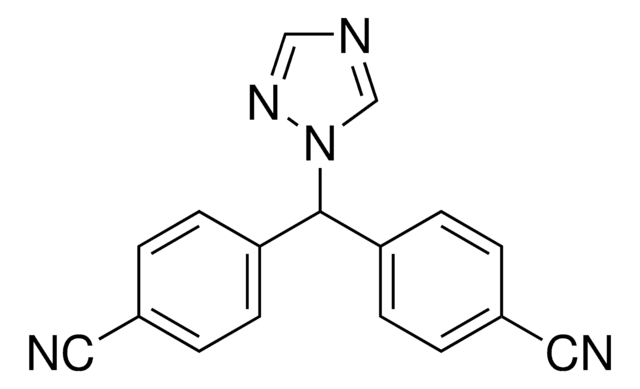I4409
Fulvestrant
>98% (HPLC)
Synonym(s):
(7α,17β)-7-[9-[(4,4,5,5,5-Pentafluoropentyl)sulfinyl]nonyl]estra-1,3,5(10)-triene-3,17-diol, Faslodex, ICI 182,780, ZD 182780, ZD 9238, ZM 182780
About This Item
Recommended Products
Quality Level
Assay
>98% (HPLC)
form
powder
solubility
DMSO: >5 mg/mL
originator
AstraZeneca
storage temp.
2-8°C
SMILES string
[H][C@]12CC[C@]3(C)[C@@H](O)CC[C@@]3([H])[C@]1([H])[C@H](CCCCCCCCCS(=O)CCCC(F)(F)C(F)(F)F)Cc4cc(O)ccc24
InChI
1S/C32H47F5O3S/c1-30-17-15-26-25-12-11-24(38)21-23(25)20-22(29(26)27(30)13-14-28(30)39)10-7-5-3-2-4-6-8-18-41(40)19-9-16-31(33,34)32(35,36)37/h11-12,21-22,26-29,38-39H,2-10,13-20H2,1H3/t22-,26-,27+,28+,29-,30+,41?/m1/s1
InChI key
VWUXBMIQPBEWFH-WCCTWKNTSA-N
Gene Information
human ... ESR1(2099) , ESR2(2100)
Looking for similar products? Visit Product Comparison Guide
Application
- as an antagonist of estrogen receptor (ERα and ERβ) to reduce hepatocytes proliferation
- as an antagonist of ER for the suppression of estrogen responsive element in human breast cancer MCF-7 cells
- as anti-estrogen in breast cancer cell lines
Biochem/physiol Actions
Features and Benefits
Signal Word
Danger
Hazard Statements
Precautionary Statements
Hazard Classifications
Aquatic Chronic 1 - Lact. - Repr. 1B
Storage Class Code
6.1C - Combustible acute toxic Cat.3 / toxic compounds or compounds which causing chronic effects
WGK
WGK 3
Flash Point(F)
Not applicable
Flash Point(C)
Not applicable
Personal Protective Equipment
Choose from one of the most recent versions:
Certificates of Analysis (COA)
Don't see the Right Version?
If you require a particular version, you can look up a specific certificate by the Lot or Batch number.
Already Own This Product?
Find documentation for the products that you have recently purchased in the Document Library.
Customers Also Viewed
Our team of scientists has experience in all areas of research including Life Science, Material Science, Chemical Synthesis, Chromatography, Analytical and many others.
Contact Technical Service













